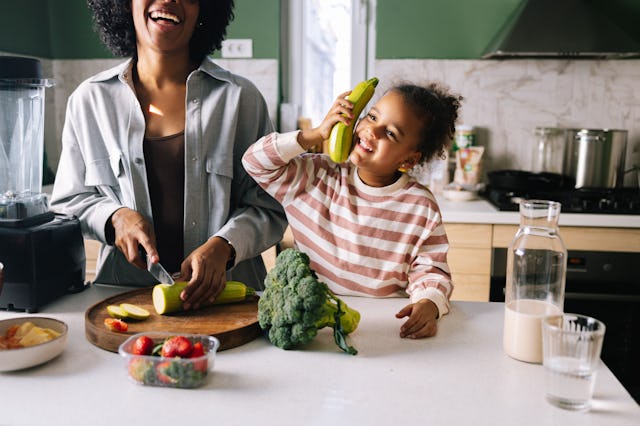Is It OK For My Kid To Be A Vegetarian?
If your child asks to not eat meat, you’ll want to eyeball their diet to be sure they are a healthy vegetarian.

One day your child connects the dots between a chicken nugget and the feathered friend. If you’re not already a plant-based diet family, this lightbulb moment could turn your kid in that direction. City kids, especially, may not grasp that a hamburger is a cow until they’re old enough to declare, “I want to be a vegetarian.”
If you’re not a vegetarian yourself, the idea can raise questions about whether your child can still be healthy without meat, able to get protein and iron and other essential nutrients. Vegetarian eating can be healthy for kids, full stop. But watch to ensure they’re embracing all the good stuff — fruit and vegetables, beans and tofu — and not just eating meat-free junk food.
Plant-Based vs. Vegetarian vs. Vegan
A plant-based diet is more or less flexitarian, focused on fruits, veggies, nuts, legumes, and anything else that starts from something grown in the ground. But this diet has room for occasional meat. After all, it is “plant-based” and not “plant-exclusive.” If you get your child to start here, you’ll have the easiest road as the family food shopper and cook.
Vegetarians, on the other hand, generally don’t eat “anything with a face,” as my vegetarian brother and husband say. No beef, poultry, or fish. However, they’ll eat eggs and dairy from animals that are allowed to live. My firstborn turned vegetarian on me, and I don’t worry about their protein because eggs and dairy have plenty of that. I used to wring my hands about iron until I realized it’s in tofu, nuts, spinach, beans, and a bunch of other things my kid will eat.
“The American Academy of Pediatrics gives examples of foods to include, but overall, ensuring a wide variety of plant products, eating ‘all the colors of the rainbow,’ and not filling up on processed and simple carbohydrates are important for a vegetarian,” says Jessica Lazerov, MD, a pediatrician at Children's National Hospital in Washington, DC.
Vegans are the most strict group. They won’t eat animals or animal byproducts. If your child chooses this path, it’s especially important to stock healthy options so that a bag of tortilla chips and a jar of salsa is not their “meal.” My college-age nephew has gone vegan, but he’s also good about researching what he needs and using tofu as well as cheese- and meat-substitutes to make himself meals, so his mom doesn’t have to stress.
At What Age Is It OK to Become a Vegetarian?
There is no age when it’s not OK to be a vegetarian. “Often the desire to explore plant-based diets comes later in the pre-teen or teenage years,” Dr. Lazerov says. “My own child decided they wanted to eat less meat and explore a vegetarian lifestyle around age 11 or 12, so we experimented with plant-based protein such as tofu and beans. We encouraged them to occasionally plan and prepare dinner.”
That said, younger kids can be vegetarian. Lazerov says, “I have seen toddlers who seem to prefer meatless meals.” I have a second set of nephews who were raised meat-free from birth. But their parents already ate that way, which definitely made meals simpler. The New York Times has published some good tips for raising a baby or toddler vegetarian.
Being Vegetarian, Of Course, Is Not the Same as Being a Picky Eater
We all know a picky eater. They tend to want bland food and act as though every plate is a minefield. But picky eaters are not necessarily vegetarians — in fact, chicken nuggets are often a picky eater’s favorite. Vegetarians are not “picky” eaters. They are grossed out at the idea of eating flesh, the way you’d be grossed out to eat a bug. Many of us, me included, can compartmentalize and separate our delicious salmon teriyaki from the fish that swims. But vegetarians can not or will not do that mind trick, and so that’s something you have to respect (or at least accept). They’re not picky; they just have strong boundaries!
Helping Your Child Navigate Life as a Vegetarian
You can give your child meat-free meals at home, but it’s a different story once they’re a vegetarian out in the world. Grandma might not want to make “two dinners,” and a party might include a pizza loaded with pepperoni. My advice is to advocate for your child when you can (like with Grandma) but to give your child advice on what to do in other situations. Give them permission to ask, “Is there meat in this?” Be sure they know how to turn things down politely, with language such as, “Thank you so much, but I’m a vegetarian so I have to pass.”
Stash a protein bar in their backpack. And remind them that not every situation will be vegetarian-friendly, but they can always eat their real meal when they return home. “The take-home message is that when eliminating meat, families should be sure that nutrient intake remains good,” says Lazerov. “It takes a little extra work, but can definitely be done.”
This article was originally published on